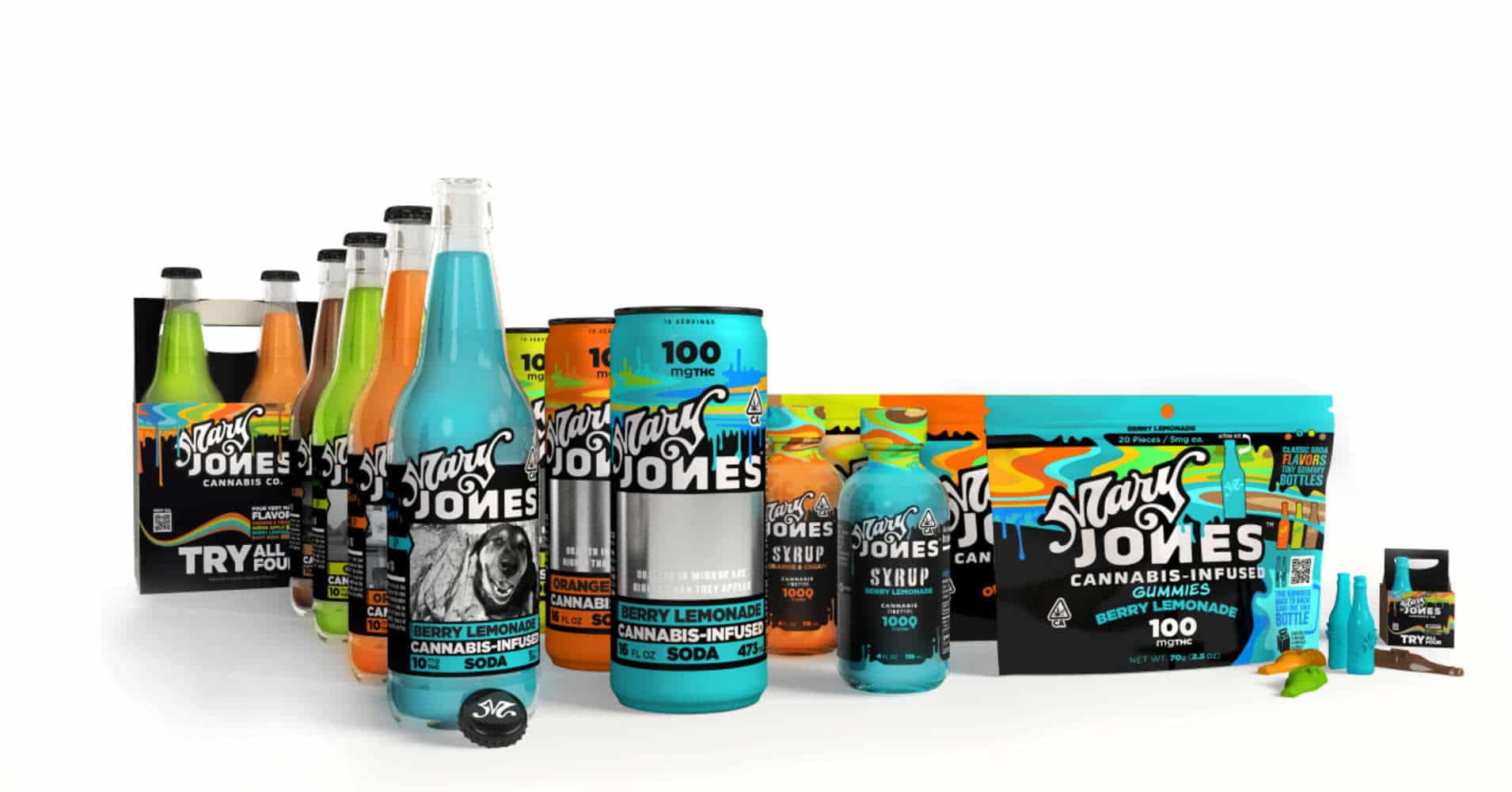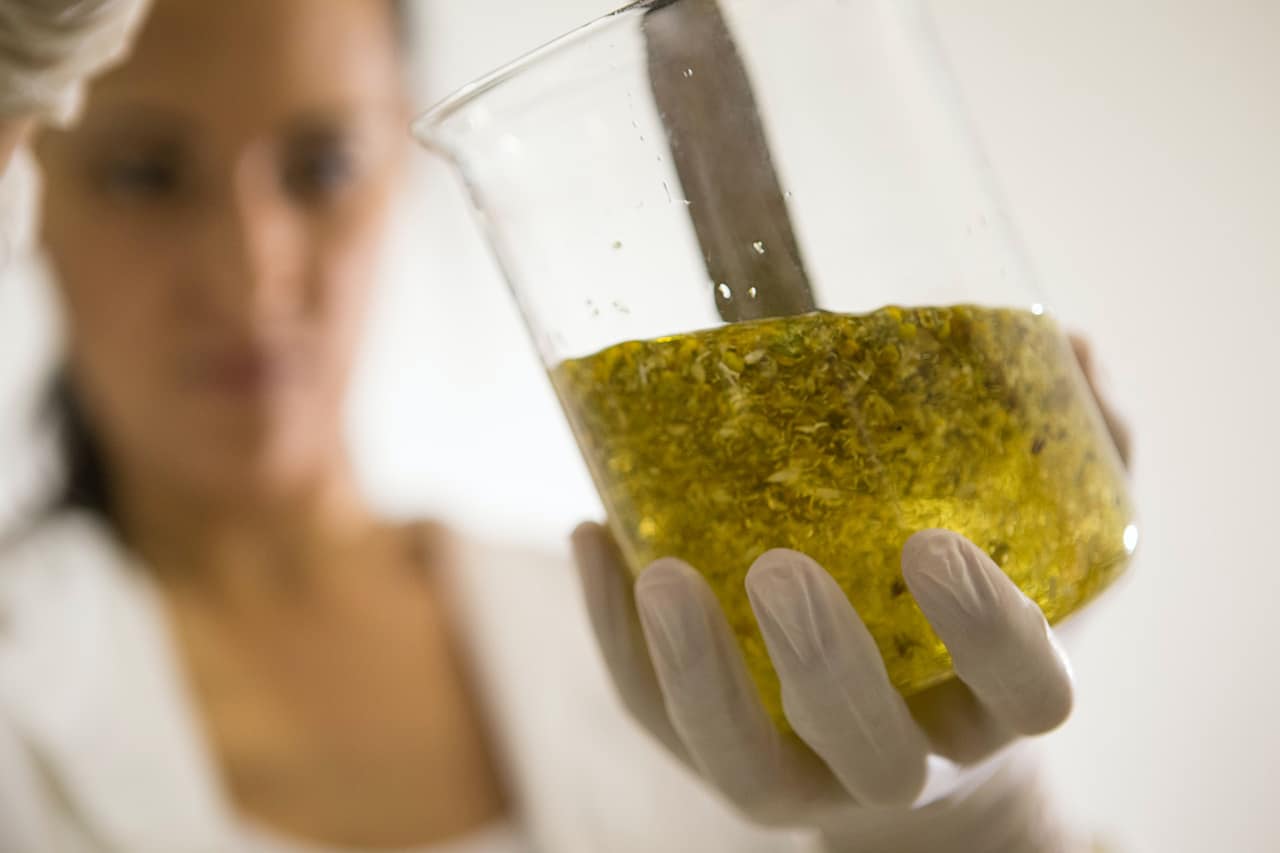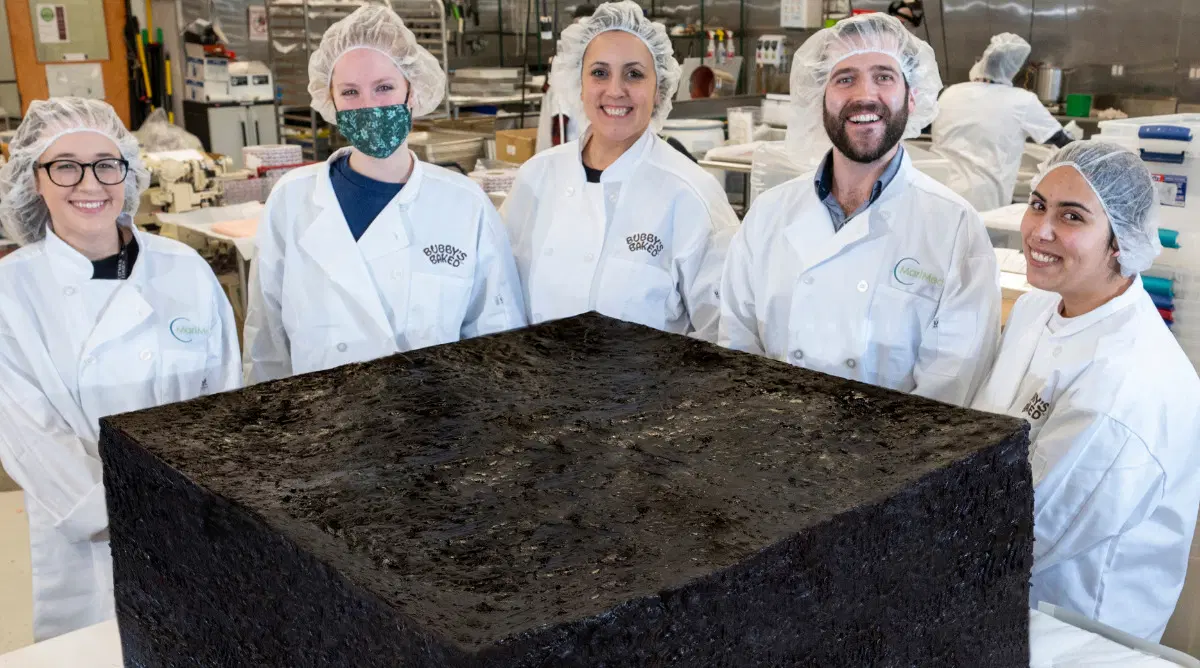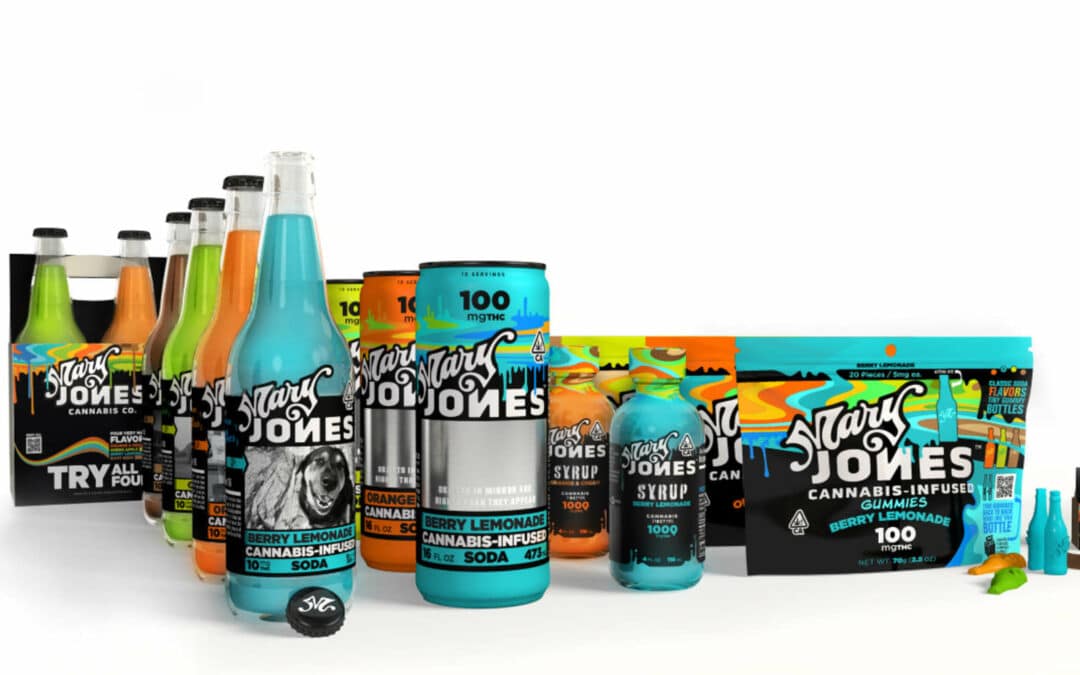
by Travis C | Mar 11, 2022 | 420 Culture & Travel, Blog, Cannabis Business, Cannabis News, Culture, Industry News, Legalization
You may have seen their bottled sodas at your local grocery store. Now Jones Soda is dipping their feet into legal cannabis with a line of new products.
Mary Jones — the new brand from Jones Soda — will introduce cannabis-infused drinks, gummies and syrups to California consumers on April 1. According to the company’s marketing chief Bohb Blair, the company is hoping their recognizable branding will help them gain a chunk of the cannabis drink marketshare that is increasing constantly.
As a smaller, craft soda company, Jones Soda’s 2021 revenue was only .04% of what Coca-Cola pulled in, at just $14.8 million. However the company is using its smaller size to their advantage.
While larger companies like PepsiCo and Coke are hesitant to enter the cannabis drinks market due to federal legality, Jones is more willing to take the risk.
Blair believes that the company’s brand recognition as a quality, craft soda company will give them the edge over existing soda drinks. The current products on the market, according to Blair, are light on flavor and low on dosage. This leaves the door open for Mary Jones to capitalize.
“Health claims aren’t our equity, full flavor is,” Blair said. “We had some conversations early on: Should we be putting CBD in this? And no, it’s not who we are.”
The initial launch will include four different product lines: 12-ounce bottles of soda infused with 10 milligrams of cannabis; 16-ounce cans of soda infused with 100 milligrams of cannabis; syrup designed to mix with other drinks or on food with 1000 milligrams of cannabis per bottle; and gummies infused with five milligrams of cannabis, shaped like mini Jones Soda bottles.
While they are starting in California dispensaries only, Mary Jones already has plans to expand to every legal state in the country.
“We have been putting all of these pieces in place since we announced our intention to establish a cannabis division last July, and we fully expect the brand to deliver solid strategic growth for the company,” CEO Mark Murray said in a statement.
Because the new line of products will only be sold in dispensaries, Jones Soda isn’t worried about consumers mixing up the labels. To distinguish the new products from their traditional line, the Mary Jones branding is a different design, with THC dosages printed in large font.
As a publicly traded company, it is a bold move for Jones Soda to enter the cannabis-infused products market, However they aren’t the first.
Molson Coors, Anheuser-Busch and Boston Beer — the maker of Samuel Adams — have all started their foray into the legal cannabis industry. However there haven’t been any well-known soda companies that made the move, until now.
While still small and lesser known than the big names, Jones Soda has a name that is recognizable on grocery store shelves. As long as Mary Jones can utilize that recognition on dispensary shelves, the new line of products will likely bring a fresh take on cannabis-infused drinks to the market.
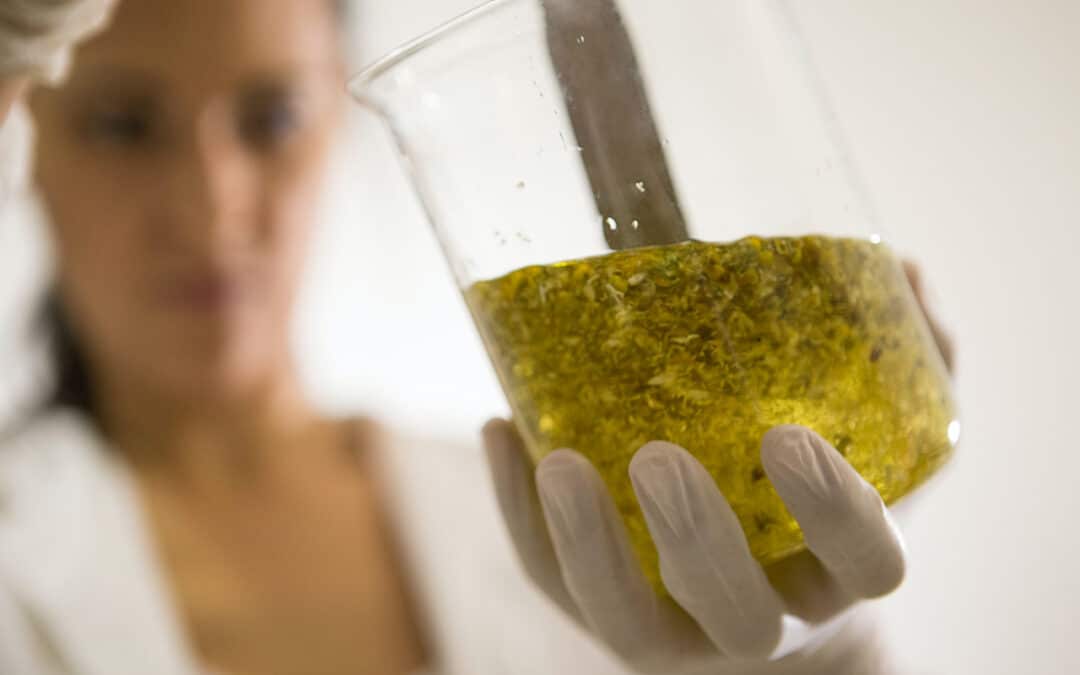
by Travis C | Mar 3, 2022 | 420 Culture & Travel, Blog, Cannabis Science, Culture, Medical Marijuana
There’s no shortage of ways to consume cannabis these days. From traditional flower consumption to extracts and edibles, there is something for everyone.
But the tradition of making cannabis edible products at home hasn’t gone anywhere. Cannabis tincture is one of the oldest cannabis edible products that has been made DIY for decades. Knowing how to make tincture provides a way to create your own cannabis edibles easily with just a few steps.
Check out our simple cannabis tincture recipe to learn how to make tincture and create your own quality edibles at home!
What is cannabis tincture?
A tincture is typically an alcohol-based extraction that is made with a high-proof alcohol like Everclear or other grain alcohol. Tinctures themselves have been used in medicine for centuries.
Cannabis tincture has become popular because it is easy to make with few ingredients, and it is a tried and tested method that we know works. Compared to other edibles that require baking or mixing in multiple ingredients such as brownies, cookies or gummies, a cannabis tincture recipe will typically only have just two ingredients; cannabis and alcohol.
The result is a liquid form concentrate that can be easily consumed with a dropper under the tongue. This consumption method is typically faster acting, making it great for those who don’t want to wait an hour for edibles to kick in.
In addition to consumption with the dropper, another major benefit of cannabis tincture is that it can be mixed into just about everything. Once you know how to make tincture there is more room for experimentation like adding in flavors, other herbs and adding it into various dishes.
Using MCT oil instead of alcohol
When purchasing cannabis tinctures from retailers, it is likely that the tincture will be made with MCT oil instead of alcohol. This can be for a few reasons.
MCT oil, or Medium Chain Triglyceride, is a cheaper alternative that is more readily available than high proof alcohol, which may not even be legal in various states in the US. It doesn’t have any flavor, it is colorless and it has a high smoke point. These qualities make MCT great for longer cannabinoid extraction processes that can create a more concentrated final product.
Anyone who wants to avoid any hint of alcohol taste in their tincture should definitely consider picking up MCT oil instead. It may even be available at your local grocery store.
Now, on to the cannabis tincture recipe!
How to make tincture (alcohol based)
Firstly, you’ll need to gather your “ingredients” for making the cannabis tincture. Luckily very few are required. Here is what you will need for this alcohol-based cannabis tincture recipe:
- 1 Glass Jar
- 1 Baking Sheet
- 1 Small Funnel
- 1 Strainer (cheesecloth or coffee strainer will do)
- 1 Glass Tincture Bottle with Dropper
- Cannabis Flower (at least an eighth of an ounce)
- High proof alcohol (190 proof grain alcohol recommended)
One of the most overlooked steps in following a cannabis tincture recipe is the decarboxylation process. More commonly called “decarbing”, this process helps to activate the THC molecules in the flower using heat. This is why you cannot get high from just eating raw cannabis flower.
To decarb your cannabis, break it up and place it on the baking sheet. Preheat your oven to 230 degrees Fahrenheit and place the baking sheet in for 30 minutes. After this time is up, remove the cannabis flower and place it into the glass jar. Make sure your jar has enough space for you cannabis flower and your alcohol.
After adding enough alcohol to completely submerge the cannabis, seal the jar and store it in a cool, dark place for at least three weeks. Be sure to shake the jar once daily for roughly 21 days. This is typically how long it takes for the cannabinoids to completely dissolve into the alcohol.
Extremely impatient people can instead shake the jar rapidly for several minutes after sealing it and strain it after for a much quicker, and much less potent result. For everyone else, the jar can be strained after 21 days through your filter, into the tincture bottle. It can be easy to overfill the bottle without leaving room for the dropper, so make sure to leave a little extra room at the top.
That’s it! Your alcohol-based cannabis tincture is done and ready to consume. For those that want to make tincture with MCT oil instead, the cannabis tincture recipe is slightly different. However it’s just as easy, and even quicker!
Cannabis tincture recipe (MCT Oil)
To make cannabis tincture with MCT oil instead of alcohol, the only addition is a crockpot. In terms of ingredients, you’re just swapping out the alcohol for MCT oil. You will want to use roughly an eighth ounce of flower per 1 cup of MCT oil.
The first crockpot method is super simple. Pour in your MCT oil followed by your decarbed cannabis flower. Turn the crockpot to “warm” or “low” and simmer 2 to 4 hours, stirring occasionally. Lower time requires a higher temperature, while longer time can stay at a lower temperature. The community is split on which produces a better product, so it is probably comparable either way.
Pouring the finished tincture directly from your crockpot into a dropper jar will prove difficult. So strain your tincture first into a larger jar to separate out the cannabis flower. You can then use this jar to store the bulk of your tincture, and refill your dropper bottle as needed from the jar.
If you’re really trying to avoid extra mess, or if smell is an issue, there is a twist on the crockpot method that will help.
Instead of pouring your MCT oil and cannabis directly into the crockpot, fill the crockpot about halfway with water. Then take your MCT oil and cannabis measurements and put them into a sealed glass jar. Put the sealed jar into the water filled crockpot and turn it to “High”.
Burp the jar and shake it regularly to make sure there isn’t a build up of pressure. After 30 minutes, strain into your dropper bottle and the tincture is done.
Knowing how to make tincture at home can save a lot of money at the dispensary. Not only that, having a cannabis tincture recipe on hand is always useful, and not just for cannabis! The medicinal benefits of various herbs and flowers can be extracted in the same exact way.
Let us know what you think of this cannabis tincture recipe and how it worked out for you, and what we should give a guide on next!
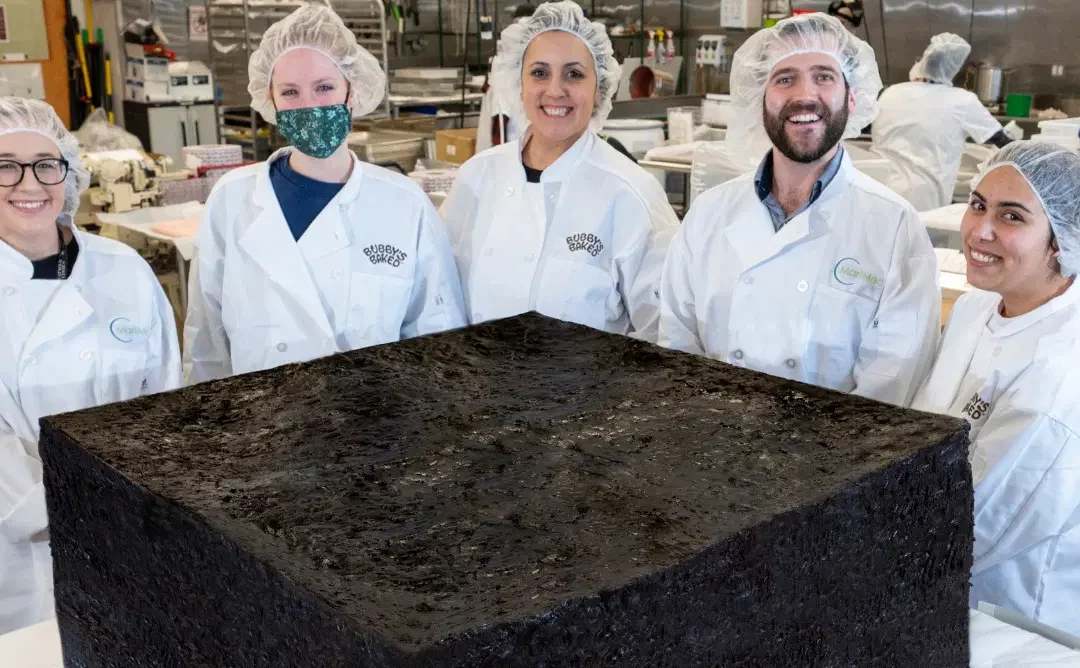
by Travis C | Dec 10, 2021 | 420 Culture & Travel, 420 News, Blog, Cannabis News, Culture, Legalization, Stranger Than Fiction
In honor of National Brownie Day on December 8th, a Massachusetts cannabis company has created a record breaking cannabis edible treat.
MariMed, Inc. unveiled the 850-pound brownie infused with 20,000 milligrams of THC on Tuesday as part of its new edibles bakery brand, Bubby’s Baked.
According to USA Today, the brownie was made using 1,344 eggs, 250 pounds of sugar, 212 pounds of butter, 5.3 pounds of vanilla extract, 81 pounds of flour, 2 pounds of baking powder, 3 pounds of salt and 122 pounds of cocoa powder, and came in measuring 3 feet wide by 3 feet long and is 15 inches tall.
The previous world record for a cannabis brownie according to the Guinness Book of World Records was 243 pounds. The Bubby’s Baked brownie destroyed that record.
For a new edible company attempting to bring quality, tasty cannabis edible products to the Massachusetts cannabis industry, this was a great marketing effort.
“For many of us, homemade brownies were our first taste of cannabis-infused edibles. Bubby’s recreates and elevates that nostalgic experience, infusing full-spectrum, craft-quality cannabis into timeless recipes, for a reliable high reminiscent of simpler times,” said MariMed Chief Product Officer and SVP/Sales Ryan Crandall in a news release.
The new edible line will be available in Massachusetts cannabis dispensaries with plans to expand to Delaware and Maryland in 2022.
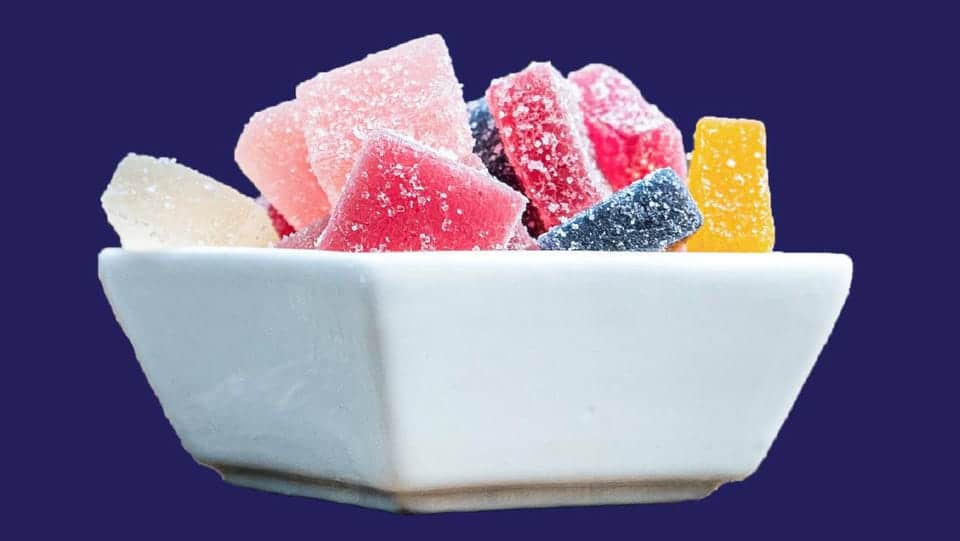
by The Real Dirt | Oct 14, 2021 | 420 News, Blog, Business, Cannabis Business, Cannabis News, Industry News, Legalization
Canadian cannabis giant Canopy Growth is (kind of) acquiring Wana Brands, the #1 cannabis edibles brand in North America by market share – per Headset data.
According to information procured exclusively ahead of an official announcement, the deal features a similar structure to the one Canopy struck with Acreage Holdings a couple of years ago. Under the agreement, the Canadian operator will acquire the right to purchase Wana (comprised of Mountain High Products, Wana Wellness and The Cima Group) once THC becomes federally legal in the U.S.
The call option to acquire 100% of the membership interests in each Wana entity is being acquired by Canopy for upfront cash payment of $297.5 million.
When Canopy decides to move forward with the acquisition, it will pay 15% of the fair market value of the entities being acquired. Until the purchase is complete, thought Canopy Growth will have no economic, voting or controlling interest in Wana, which will continue to operate independently.
“Through the agreement with Wana, Canopy is adding another industry leading brand to power our rapid growth across the U.S. Wana has built a successful business using an asset-light licensing model, allowing them to scale across North America,” David Klein, CEO of Canopy Growth, said in an exclusive interview.
Breaking down the key strategic benefits of the acquisition, Klein explained Wana:
- Strengthens Canopy Growth’s U.S. ecosystem.
- Provides exposure to one of the fastest growing segments in both the U.S. and Canadian cannabis markets: edibles.
- Would automatically make Canopy a leader in the edibles category.
- Increases Canopy’s exposure to the U.S. market upon federal legalization.
- Represents an opportunity to acquire a profitable and highly scalable business.
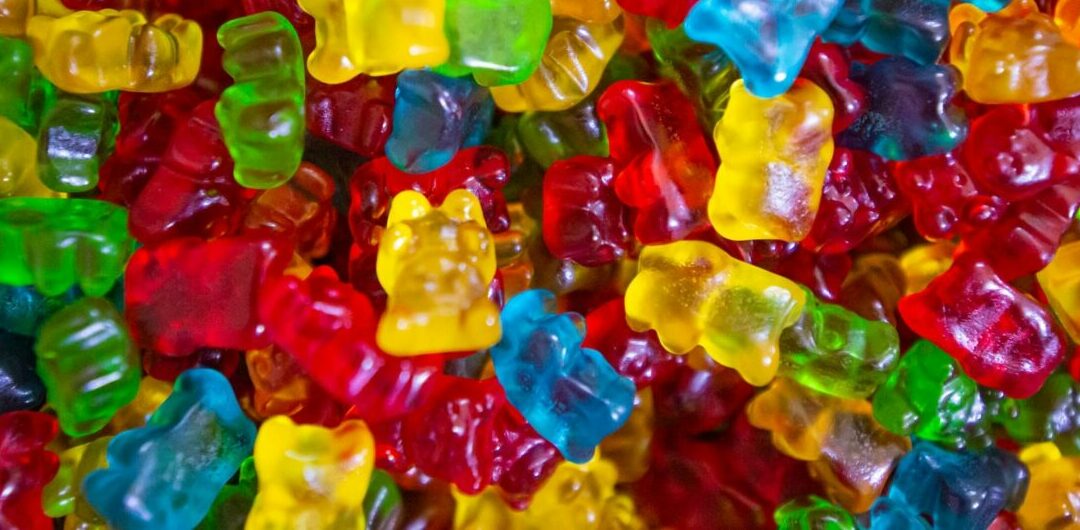
by Travis C | Sep 28, 2021 | Blog, Business, Cannabis Business, Cannabis Law, Cannabis Law and Compliance, Cannabis News, Industry News, Legalization, Politics
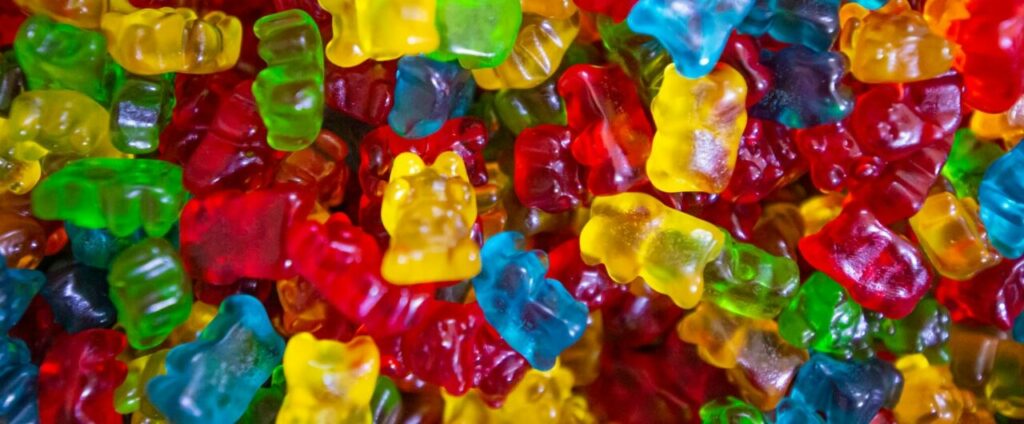
Nearly a year after passing a constitutional amendment to legalize cannabis, New Jersey has yet to open a single retail cannabis store. While the industry has yet to take off, that isn’t stopping regulators from preemptively banning one of the most popular cannabis products.
When it comes to the cannabis products that consumers want, flower remains king. Vaporizer pens and concentrates for dabbing have been slowly catching up with flower as consumers seek a quicker way to get the desired effects of cannabis without burning the plant itself.
However, cannabis edibles have also been gaining popularity. Avoiding the need for any sort of inhalation at all, edibles are great for consumers who don’t want to vape or smoke, but still want the effects of cannabis.
Cannabis beverages have seen the greatest growth since the beginning of 2020, when cannabis sales skyrocketed across the country due to the COVID-19 pandemic. Cannabis capsule products have also grown noticeably in popularity, showing that consumers are seeking a way to consume cannabis without, well, consuming traditional cannabis.
With such growth in the edible cannabis market, it would seem obvious to any potential industry that is about to open that edibles will be a high-demand product. Higher demand means higher profits, which is what any state is seeking when legalizing cannabis.
Unless you’re New Jersey.
Ban on almost all cannabis edibles
Despite having no functional legal cannabis industry to base their decision, regulators in charge of New Jersey’s recreational cannabis have decided to ban all forms of edible cannabis products except for lozenges. This means traditional products consumers would likely be familiar with — cookies, brownies, gummies, beverages — are all prohibited.
The reasoning behind the ban is the same used by many states when they first legalize; the children. Concern over edible products that might appeal to children is a consistent issue in the legal cannabis industry.
While other states passed new regulations requiring child-proof packaging and prohibiting edibles from being designed in a manner that would be appealing to kids (i.e. gummy bears, star-shaped cookies, etc.), New Jersey has decided to take a much more restrictive approach.
According to the new set of regulations passed by New Jersey cannabis regulators, “ingestible forms of cannabis… shall only include syrups, pills, tablets, capsules, and chewable forms.”
A growing and thriving grey market
Just because regulators are dragging their feet in getting a functional legal cannabis industry up and running doesn’t mean that the people aren’t already taking advantage of the new law. Seemingly taking a tip from the Washington D.C. playbook, New Jersey has begun to develop a thriving grey market industry.
While there is nowhere to legally buy or sell cannabis directly, there’s a workaround. Similar to how D.C.’s grey market operates, New Jersey currently has a gift/donation system in place to skirt the current regulations.
In this grey market, a consumer may find a delivery service online. One the website one might see several different cannabis products, or “packages” as they might be called. However that isn’t technically what the consumer is buying.
Instead, the cannabis product is simply a “gift” that is included with the purchase of another item on the website. This might be a sweatshirt, a t-shirt, or even something as small as a sticker. The price of the sticker may be around $40, which conveniently is the same price as an eighth of cannabis.
Within a couple hours, a delivery driver will be at the door with the sticker and the included gift, and bam you just “bought” legal cannabis in New Jersey. But just like D.C.’s grey market, the grey market in New Jersey is completely unregulated.
Although a legal cannabis company has to follow strict regulations on manufacturing and packaging, an unregulated market like that which is blooming in New Jersey has no such restrictions. So while regulators may think they are making progress by banning various forms of edible cannabis products, these new rules will be all but ignored by those operating in the grey market already.
In other words, the new regulations can’t possibly have any sort of impact until there is an actual legal industry to enforce them. As regulators take their time getting the legal cannabis industry up and operational in New Jersey, the grey market will continue to thrive only making it more complicated to get legitimate businesses licensed and running.
If you are interested in learning more about the New Jersey cannabis industry, need assistance with licensing, planning and implementation of your business plan, Greener Consulting Group can help you stay on top of the latest regulatory changes, fees and best practices for getting ahead of the competition when the industry takes off.

